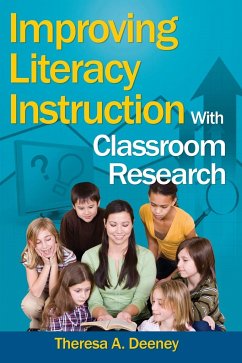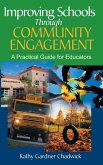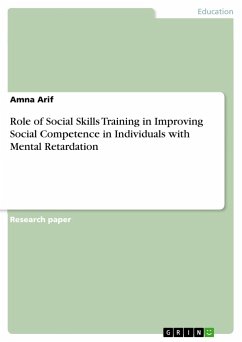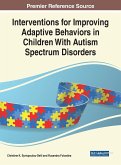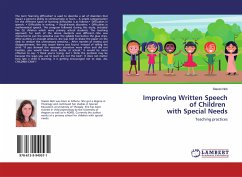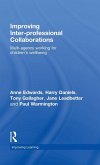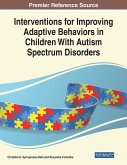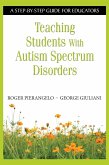Theresa A. Deeney
Improving Literacy Instruction With Classroom Research
Theresa A. Deeney
Improving Literacy Instruction With Classroom Research
- Gebundenes Buch
- Merkliste
- Auf die Merkliste
- Bewerten Bewerten
- Teilen
- Produkt teilen
- Produkterinnerung
- Produkterinnerung
The author details the classroom research cycle and provides tools and sample completed projects to help educators initiate their own research and improve literacy instruction.
Andere Kunden interessierten sich auch für
![Improving Schools Through Community Engagement Improving Schools Through Community Engagement]() Kathy Gardner ChadwickImproving Schools Through Community Engagement63,99 €
Kathy Gardner ChadwickImproving Schools Through Community Engagement63,99 €![Role of Social Skills Training in Improving Social Competence in Individuals with Mental Retardation Role of Social Skills Training in Improving Social Competence in Individuals with Mental Retardation]() Amna ArifRole of Social Skills Training in Improving Social Competence in Individuals with Mental Retardation15,95 €
Amna ArifRole of Social Skills Training in Improving Social Competence in Individuals with Mental Retardation15,95 €![Interventions for Improving Adaptive Behaviors in Children With Autism Spectrum Disorders Interventions for Improving Adaptive Behaviors in Children With Autism Spectrum Disorders]() Interventions for Improving Adaptive Behaviors in Children With Autism Spectrum Disorders213,99 €
Interventions for Improving Adaptive Behaviors in Children With Autism Spectrum Disorders213,99 €![Improving Written Speech of Children with Special Needs Improving Written Speech of Children with Special Needs]() Stasini NotiImproving Written Speech of Children with Special Needs18,99 €
Stasini NotiImproving Written Speech of Children with Special Needs18,99 €![Improving Inter-Professional Collaborations Improving Inter-Professional Collaborations]() Anne EdwardsImproving Inter-Professional Collaborations180,99 €
Anne EdwardsImproving Inter-Professional Collaborations180,99 €![Interventions for Improving Adaptive Behaviors in Children With Autism Spectrum Disorders Interventions for Improving Adaptive Behaviors in Children With Autism Spectrum Disorders]() Interventions for Improving Adaptive Behaviors in Children With Autism Spectrum Disorders165,99 €
Interventions for Improving Adaptive Behaviors in Children With Autism Spectrum Disorders165,99 €![Teaching Students with Autism Spectrum Disorders Teaching Students with Autism Spectrum Disorders]() Roger PierangeloTeaching Students with Autism Spectrum Disorders84,99 €
Roger PierangeloTeaching Students with Autism Spectrum Disorders84,99 €-
-
-
The author details the classroom research cycle and provides tools and sample completed projects to help educators initiate their own research and improve literacy instruction.
Hinweis: Dieser Artikel kann nur an eine deutsche Lieferadresse ausgeliefert werden.
Hinweis: Dieser Artikel kann nur an eine deutsche Lieferadresse ausgeliefert werden.
Produktdetails
- Produktdetails
- Verlag: Corwin
- Seitenzahl: 226
- Erscheinungstermin: 19. November 2008
- Englisch
- Abmessung: 260mm x 183mm x 17mm
- Gewicht: 629g
- ISBN-13: 9781412940887
- ISBN-10: 1412940885
- Artikelnr.: 25052373
- Herstellerkennzeichnung
- Libri GmbH
- Europaallee 1
- 36244 Bad Hersfeld
- gpsr@libri.de
- Verlag: Corwin
- Seitenzahl: 226
- Erscheinungstermin: 19. November 2008
- Englisch
- Abmessung: 260mm x 183mm x 17mm
- Gewicht: 629g
- ISBN-13: 9781412940887
- ISBN-10: 1412940885
- Artikelnr.: 25052373
- Herstellerkennzeichnung
- Libri GmbH
- Europaallee 1
- 36244 Bad Hersfeld
- gpsr@libri.de
Theresa A. Deeney is associate professor of reading education and coordinator of the graduate reading program at the University of Rhode Island. After finishing her own teacher preparation in elementary and special education, she began her career as a special education teacher. She then went on to receive an MEd in educational administration, and served as a school principal. Over twenty years, she served as a teacher, principal, reading specialist, and consultant in urban schools in Massachusetts, New Hampshire, and California. Prior to her appointment at the University of Rhode Island, she coordinated a large-scale research project at Boston University and at the Center for Reading and Language Research at Tufts University. She taught graduate courses in reading at Lesley College, Harvard Graduate School of Education, and Boston College. In 1997, she received her EdD in reading, language, and learning disabilities from the Harvard Graduate School of Education. She currently works closely with teachers on classroom research and inquiry practices that further their own professional development, and has forged school district-university partnerships focused on teacher professional development. In 2007, she received the Outstanding Outreach award from the College of Human Science and Services at the University of Rhode Island for her work with urban teachers. Her research and teaching focus on teacher education and reflective teaching practices, including classroom research.
Preface
About the Author
Part I. Understanding Classroom Research
1. What Is Classroom Research?
2. Cycling Through the Steps
3. Dealing With Data
Part II. Teachers¿ Classroom Research in Literacy
Overview
Section 1: Looking at Teaching Within Mandated Programs
Introduction
4. Reading Aloud: Do I Really Sound Like That?
5. Keeping Track of Assessment Data Makes Teaching Easier
6. Differentiating Word Study Instruction
Section 2: Tying Research to Practice
Introduction
7. "Mr. ___ Just Said Rambunctious!": Learning and Loving Vocabulary
8. Sounding Like Readers: Improving Fluency
9. Word Analysis and Phonemic Awareness Instruction for Older Students
10. Teaching Vocabulary One Part at a Time
11. Ethics and Other Issues in Classroom Research
Appendix A
Appendix B
References
Index
About the Author
Part I. Understanding Classroom Research
1. What Is Classroom Research?
2. Cycling Through the Steps
3. Dealing With Data
Part II. Teachers¿ Classroom Research in Literacy
Overview
Section 1: Looking at Teaching Within Mandated Programs
Introduction
4. Reading Aloud: Do I Really Sound Like That?
5. Keeping Track of Assessment Data Makes Teaching Easier
6. Differentiating Word Study Instruction
Section 2: Tying Research to Practice
Introduction
7. "Mr. ___ Just Said Rambunctious!": Learning and Loving Vocabulary
8. Sounding Like Readers: Improving Fluency
9. Word Analysis and Phonemic Awareness Instruction for Older Students
10. Teaching Vocabulary One Part at a Time
11. Ethics and Other Issues in Classroom Research
Appendix A
Appendix B
References
Index
Preface
About the Author
Part I. Understanding Classroom Research
1. What Is Classroom Research?
2. Cycling Through the Steps
3. Dealing With Data
Part II. Teachers¿ Classroom Research in Literacy
Overview
Section 1: Looking at Teaching Within Mandated Programs
Introduction
4. Reading Aloud: Do I Really Sound Like That?
5. Keeping Track of Assessment Data Makes Teaching Easier
6. Differentiating Word Study Instruction
Section 2: Tying Research to Practice
Introduction
7. "Mr. ___ Just Said Rambunctious!": Learning and Loving Vocabulary
8. Sounding Like Readers: Improving Fluency
9. Word Analysis and Phonemic Awareness Instruction for Older Students
10. Teaching Vocabulary One Part at a Time
11. Ethics and Other Issues in Classroom Research
Appendix A
Appendix B
References
Index
About the Author
Part I. Understanding Classroom Research
1. What Is Classroom Research?
2. Cycling Through the Steps
3. Dealing With Data
Part II. Teachers¿ Classroom Research in Literacy
Overview
Section 1: Looking at Teaching Within Mandated Programs
Introduction
4. Reading Aloud: Do I Really Sound Like That?
5. Keeping Track of Assessment Data Makes Teaching Easier
6. Differentiating Word Study Instruction
Section 2: Tying Research to Practice
Introduction
7. "Mr. ___ Just Said Rambunctious!": Learning and Loving Vocabulary
8. Sounding Like Readers: Improving Fluency
9. Word Analysis and Phonemic Awareness Instruction for Older Students
10. Teaching Vocabulary One Part at a Time
11. Ethics and Other Issues in Classroom Research
Appendix A
Appendix B
References
Index

